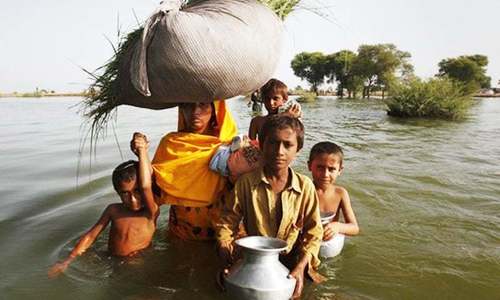BRUSSELS: Last year tied with 2016 as the world’s warmest on record, rounding off the hottest decade globally as the impacts of climate change intensified, the European Union’s Copernicus Climate Change Service said on Friday.
After an exceptionally warm autumn and winter in Europe, the continent experienced its hottest year on record in 2020, while the Arctic suffered extreme heat and atmospheric concentrations of planet-warming carbon dioxide continued to rise.
Scientists said the latest data underscored the need for countries and corporations to slash greenhouse gas emissions quickly enough to bring within reach the goals of the 2015 Paris Agreement to avoid catastrophic climate change.
Copernicus Climate Change Service says during the year temperatures were on an average 1.25 degrees Celsius higher than in pre-industrial times
“The extraordinary climate events of 2020 and the data from the Copernicus Climate Change Service show us that we have no time to lose,” said Matthias Petschke, Director for Space in the European Commission, the EU’s executive arm. The bloc’s space programmes include the Copernicus earth observation satellites.
In 2020, temperatures globally were on an average 1.25 degrees Celsius higher than in pre-industrial times, Copernicus said. The Paris accord aims to cap the rise in temperatures to “well below” 2C and as close as possible to 1.5C to avoid the most devastating impacts of climate change.
Although Covid-19 lockdowns meant global emissions of CO2 dipped in 2020 compared with recent years, the concentration of the gas accumulated in the atmosphere continued to rise.
“The key here is to — for every year and as quickly as possible — reduce the amount we emit, thus reducing the amount we actually add into the atmosphere,” said Copernicus senior scientist Freja Vamborg.
Last year also saw the highest temperature ever reliably recorded, when in August a California heatwave pushed the temperature at Death Valley in the Mojave Desert up to 54.4C (129.92F).
The Arctic and northern Siberia continued to warm more quickly than the planet as a whole in 2020, with temperatures in parts of these regions averaging more than 6C above a 30-year average used as a baseline, Copernicus said.
The region also had an “unusually active” wildfire season, with fires poleward of the Arctic Circle releasing a record 244 million tonnes of CO2 in 2020, over a third more than in 2019.
Arctic sea ice continued to deplete, with July and October both setting records for the lowest sea ice extent in that month.
Scientists said the study was consistent with growing evidence that climate change is contributing to more intense hurricanes, fires, floods and other disasters. A preliminary tally found 13 of last year’s disasters led to at least 188 deaths and costs of $46.6 billion.
Published in Dawn, January 9th, 2021
















































Dear visitor, the comments section is undergoing an overhaul and will return soon.